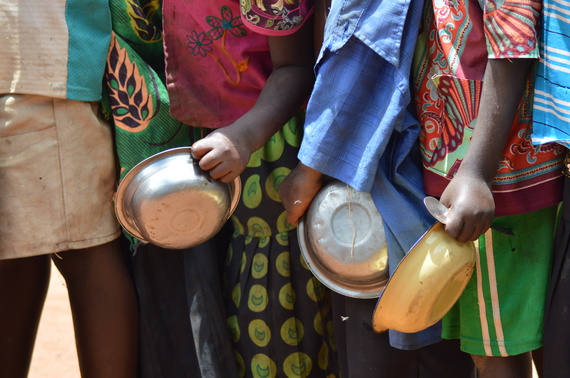In any given year, on any given day, there are countless crises happening across the globe. They range from humanitarian to environmental, economic to health, small to severe.
As the founder of a nonprofit that works in Malawi, one of the poorest countries in the world, I've come to know this reality. The core of our mission is to work in communities that are most in need, communities that are confronted with crises so frequently that they grow to be commonplace--malnutrition, unemployment, and lack of educational opportunities, to name a few.
For ten years, goods for good has confronted these crises head on.
When we first began, we did so with a model that is similar to emergency relief--distributing goods to communities. These goods addressed the immediate needs resulting from everyday crises. We were keeping kids in school, providing them with desperately needed clothing, and making sure they were fed.
But despite our short-term success, we were not addressing the underlying causes of this situation. That meant there would be crises tomorrow and the next day and the day after that. So, in 2014, we pivoted our model. We stopped simply addressing our communities' crises and began focusing on preventing them from happening in the first place.
It's been working.
goods for good's small businesses--ranging from tailoring co-ops to beehives to poultry farms--reinvest their profits back into the community. This empowers individuals to overcome the everyday crises in a local and nuanced way. They are sustainable, long-term solutions that create jobs, fund scholarships, and provide orphan care for children who have lost their parents.
To track our progress, we listened to our communities. They told us kids were back in school. Parents had stable sources of income. Orphans were getting the care they needed. Everyday crises were becoming less everyday.
Then, an entirely new crisis struck.
In the first quarter of 2015, Malawi experienced flooding that left homes damaged, crops destroyed, and lives lost. Following this devastation, in early 2016, Malawi's fragile food systems were further degraded by severe drought. Today, it is estimated that 32 million people across Southern Africa are experiencing severe food shortages, including children in our villages. The need for food is simply outweighing supply.
Hearing about this crisis from our communities, the people we have partnered with for years, was incredibly difficult. We suddenly found ourselves back in the situation we had been working tirelessly to prevent.
We couldn't help but question our mission.
When we pivoted years ago, we confidently turned away from handouts, citing challenges with dependency and lack of sustainability. However, with our communities facing starvation today, it became incredibly difficult to advocate for patience, for the promise of a better tomorrow.
As a response, we challenged ourselves to reexamine the questions we raised when shifting our model. Are direct support and long-term development inherently at odds? Is there a responsible way to provide relief without degrading progress that has already been made?
Unfortunately, this line of questioning is not unique to goods for good, Malawi, or even Southern Africa. Regardless of stated missions, organizations across the world have been increasingly forced to confront emergency situations--Zika virus in Central and South America, Ebola in West Africa, earthquakes in Haiti and Nepal, and the migrant crisis in the Mediterranean. And that is just a few.
Faced with the reality that such circumstances are increasingly common, we consulted fellow nonprofits, our supporters, and our communities to determine a course of action.
Suddenly, it became clear to us.
This was not a problem our programs were designed to address. This was not an everyday crisis, this was an emergency. Inaction threatened to destroy the principles goods for good was founded on, and destroy the lives our programs seek to help. Therefore, after a tough few days of reflection, problem solving, and analysis, our team recognized we could not build brighter tomorrows without ensuring survival today. We had to provide emergency food relief to our communities. And we would do so with our mission in mind, not in spite of it.
goods for good is committed to long-term development, the prevention of crises and sustainable change. But we also understand fast action is necessary for those facing extreme susceptibility to poverty, hunger, and disease. Sustainable change takes time. It takes patience. It takes flexibility and nuance when faced with unexpected challenges. By ensuring that core funding and focus do not deviate from ongoing programs, critical aid can be delivered to those who need it, all while remaining true to long-term development.
From commonplace crises to emergencies, we are all committed to creating a greater good--and sometimes that means taking unforeseen action to preserve it.
